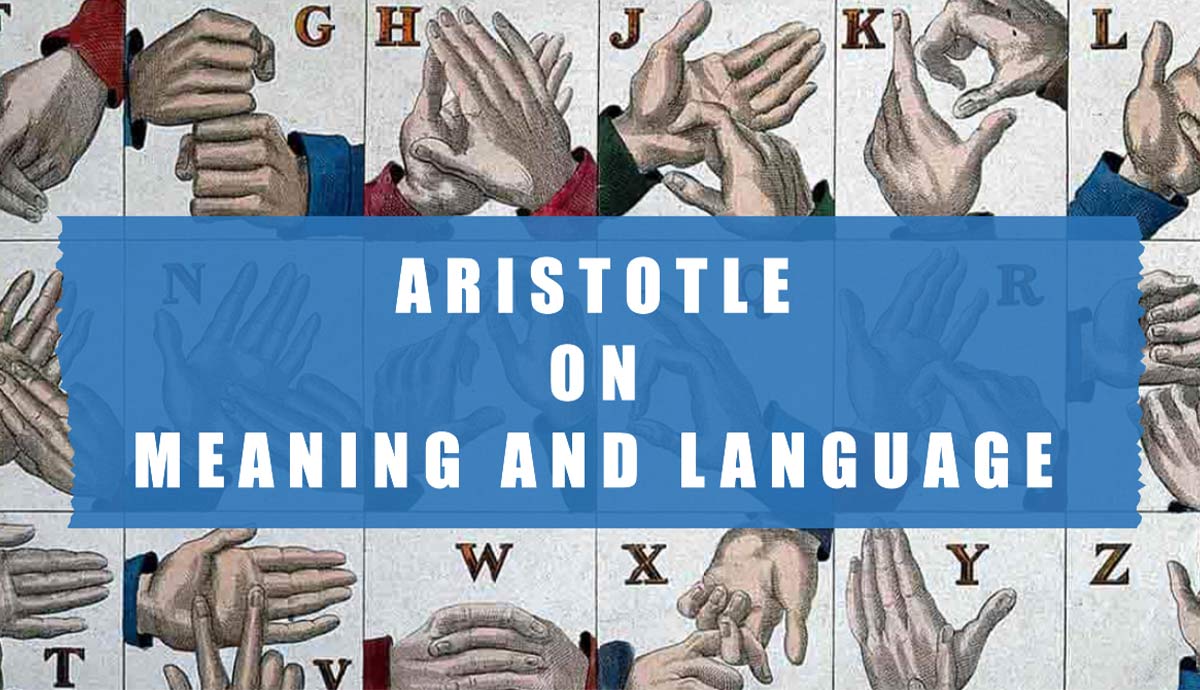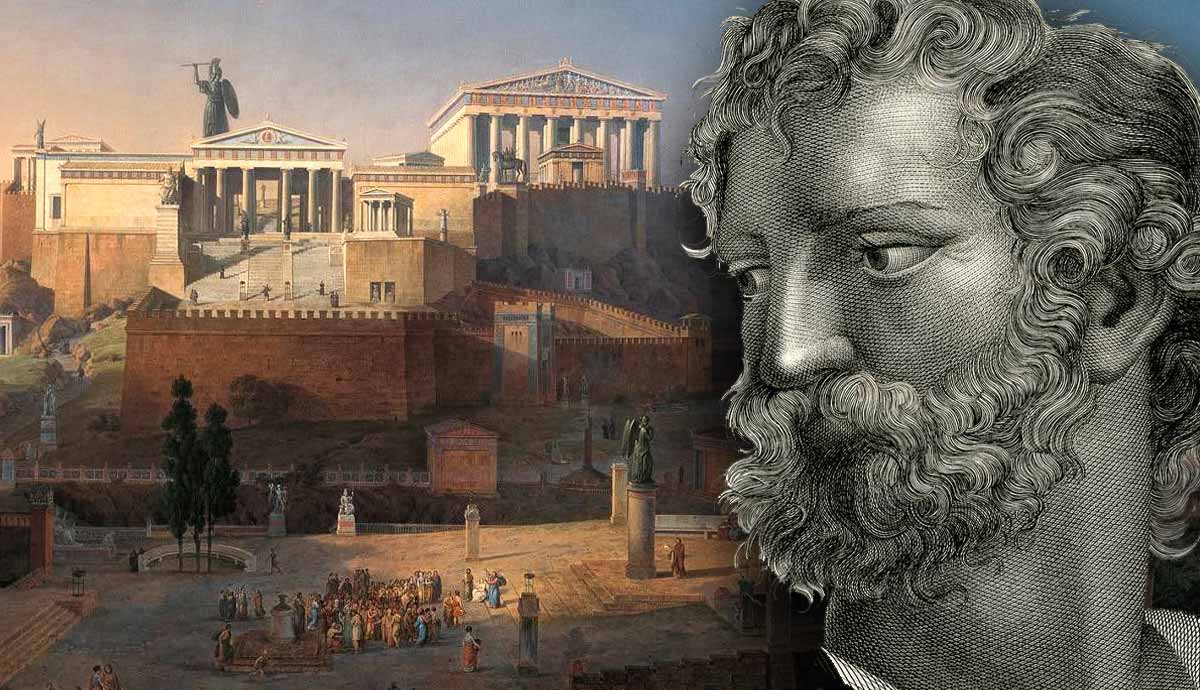
The philosophy of language is one of the most significant subdisciplines for contemporary philosophers. Yet ancient philosophers had less to say about language. This article attempts to examine what Aristotle had to say about language and the theory of meaning in particular.
Aristotle and Greek Philosophy

Aristotle was one of the two greatest and most influential Greek philosophers, along with Plato. Indeed, in the eyes of many philosophers today, he and Plato are the two greatest philosophers—period. Many of the philosophical issues and problems which we discuss today have their roots in Aristotle’s work.
Yet this article addresses an area of philosophy on which Aristotle has less to say than many others; that is, the philosophy of language. Yet, what Aristotle does have to say about the theory of language and meaning is striking and worth paying attention to.
It is worth saying something about Aristotle’s corpus as a whole before we develop our analysis of his theory of language too much further. There is no hope of offering a brief surmise of what he thought, but it would be helpful to keep in mind that Aristotle’s work has come down to us in the form of what we now think are lecture notes rather than (as with Plato’s dialogues) work ready for publication. However, we ultimately interpret Aristotle’s work has to be underwritten with the acknowledgment that we rarely, if ever, have access to a final expression of his philosophy.
De Interpretatione and Its Context

The only explicit definition of meaning that we find in Aristotle’s work comes from De Interpretatione, his work on interpretation. The controversial passage goes as follows:
“Spoken words then are symbols of affections of the soul, and written words are symbols of spoken words. And just as written letters are not the same for all humans, neither are spoken words. But what these primarily are, are signs of the affections of the soul, are the same for all, as also are those things of which our affections are likenesses.”
One of the most important questions we can ask of the view Aristotle is expressing here is whether it constitutes a theory of meaning or something else. We will return to this question. A more straightforward question to ask, if not to answer, is what position this view is expressing. Aristotle seems to be drawing a series of relations—between spoken words and psychological states (affections of the soul), between spoken words and written ones, and between signs and psychological states.
Straightening all of this out is going to require careful contextual analysis because we have no hope of making sense of Aristotle’s work unless we can say for certain what it is that he’s actually responding to. What, in other words, has been said about language and meaning before Aristotle?
Plato and the Cratylus

The most important precursor to Aristotle in terms of his theory of language is, unsurprisingly, Plato. In particular, Aristotle can be understood as responding to the theory of meaning and language which Plato puts in the Cratylus.
This dialogue is structured around a three-way discussion between Hermogenes, Cratylus, and Plato’s ‘avatar’ Socrates. Cratylus is typically understood as a challenge to the very possibility of developing a theory of meaning.
There are two kinds of theories of meaning which are discussed in Cratylus. First, there is conventionalism, the theory which holds that words are conventionally determined signs, in the sense that the meaning of words (what they signify) is entirely a matter of social convention or implicit agreement. One implication of conventionalism is that the meaning of words could, even if only in principle, be changed on a whim. This is one reason why many philosophers have found conventionalism (in certain forms) quite unconvincing.
The other theory that is addressed in the Cratylus is that of naturalism, which holds that words are natural signs that indicate extralinguistic entities (in other words, objects). Both of these theories can be given very plausible accounts, and indeed, as Deborah Modrak (to whom this article is indebted more generally) observes, there are obvious contemporary positions that are direct correlates of these positions. However, the versions of conventionalism and naturalism put forward by Hermogenes and Cratylus are extreme and quite implausible.
Plato’s Argument

Conventionalism is rejected on the basis that if language is a tool for marking real distinctions between things, then it cannot simply be a matter of convention. We could not change the relations between things on a whim, after all. A radical subjective view, which is what conventionalism collapses into in the Cratylus, is rejected on the grounds that what a language means must depend to some extent on a more general agreement—that mutual intelligibility is a necessary condition for something to be called a language.
Naturalism is dismissed on the basis that it is too difficult to tell a plausible story about the connection between a word and an object that it represents based on a natural relation between the two.
It is worth saying here that Plato is focused not on language as such or the structure of language but on Greek specifically. Aristotle’s theory of meaning can be read as an attempt to meet the challenge laid down by Plato in the Cratylus, and to do so by developing a kind of intermediate position relative to Hermogenes and Cratylus.
Aristotle’s Response to Plato

To expand on those ideas further, the conclusion Aristotle seems to draw from the Cratylus is that an adequate theory of language will account for the claim of language to be a tool of understanding and explicate that claim in such a way that it allows for the history of language change and growth. Such a theory would also distinguish between the language of thought and spoken language.
This is the task Aristotle sets to in De Interpretatione. The task of the philosophy of language is to acknowledge the plastic nature of language and yet to make sense of the capacity of language to articulate truths (of a kind which do not change, and so are themselves not plastic in the way languages tend to be). This leads Aristotle to adopt a theory that has both a conventionalist aspect and a naturalist aspect.
Aristotle is a conventionalist about sound and the meanings borne by sound and a naturalist about the relation between meaning and reference (between, roughly, the thing we have in our heads when we understand a word and the ‘real’ correlate of that thing). On Aristotle’s view, two kinds of relation are established by way of social practice: the relationship between the written word and the spoken word and the relationship between the spoken word and the aforementioned psychological state.
Aristotle and Contemporary Philosophy

The philosophy of language is, as Michael Dummett observes, the closest thing that modern Anglophonic philosophy has to a subdiscipline worthy of the name ‘first philosophy.’ It is certainly the area of philosophy that many philosophers take to establish certain foundations for other subdisciplines. To develop a theory of meaning is, therefore, one of the things that contemporary philosophers spend their time doing, and generally, to develop such a theory is to develop it for any possible language.
It is important to stress that this is not what Aristotle is doing. Aristotle, unlike modern philosophers, is not attempting to offer a theory of meaning for any possible language, but rather he is attempting to describe meaning as it seems to function in actual languages. Obviously, this isn’t unrelated to an attempt to theorize meaning in any possible language (far from it), but it is different.
One of the differences is the very fact that the philosophy of language does not represent the first philosophy of Aristotle. In fact, it doesn’t even come close. Language is, first and foremost, a tool for understanding. Our philosophy of language is always going to be secondary to the metaphysical, logical, and epistemological perspectives that underlie it. The philosophy of language will presuppose the purpose of language itself. Rather than constituting the raw material of thought, language is both separable from thought and separable from corresponding entities. The proper use of language consists of using it to get things right about the world as it exists independently of us and our attempts to describe it.










